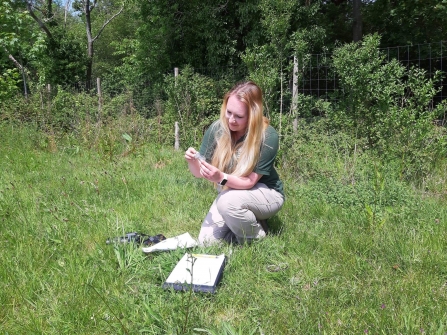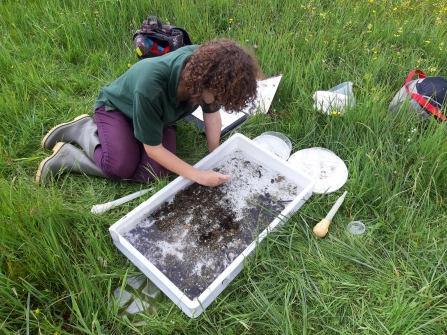Kate Gwynn
Introducing HIWWT's New Trainee Ecologists
Hello! I’m Kate and I’m a Trainee Ecologist with Hampshire and Isle of Wight Wildlife Trust.
Previous to this role, I completed an undergraduate degree in Ecology at Aberystwyth University. I took a year out from my studies to work as a Field Assistant for the Wildlife Trust of South and West Wales. Determined to pursue a career in conservation and ecology I applied for the role with HIWWT and was successful. I moved to Hampshire straight away and began exploring all the Wildlife Trust reserves I could before my position began.
The past 2 months have been incredibly exciting and busy, refreshing old skills and learning plenty of new ones! As a Trainee Ecologist, I assist in and undertake a huge variety of surveys and field work. Some of the species I’ve worked with already include: white-clawed crayfish, great crested newts, dormice, reptiles and badgers. I’ve also undertaken training to become a river invertebrate monitor at our Winnall Moors reserve in Winchester. If you see me there with a net and bucket, come over and see what I’ve found!
Aggie Thompson

Trainee Ecologist Aggie Thompson conducting an Orthoptera survey
©Kate Gwynn
Hi, I’m Aggie, one of the new Trainee Ecologists at HIWWT! I am an aspiring wildlife conservationist, with an undergraduate degree in Zoology, a Masters of Research in Wildlife Conservation and experience working for a global conservation charity. Most of my work so far has revolved around British bats, studying relationships between different species and their habitats. I am therefore very excited about the wide variety of species I will have a chance to work with in this position, and ultimately becoming a well-rounded ecologist!
I have only been here five weeks so far, and already I’ve had the opportunity to take part in many different surveys, including invertebrate transects, bat activity and emergence, dormouse box checks, woodland regeneration assessment and great-crested newt and reptile surveys.
I am really looking forward to the next few months, where I will continue to build my skills in identification and surveying for important and protected species. I am excited to be involved in work both on Trust sites, and those owned by private landowners looking to improve their land for wildlife.
Jack Hawnt
Trainee Ecologist Jack Hawnt assisting with a dormouse survey
©Sarah Boswell
I have without a doubt a passion for wildlife and conservation as a whole. I gained my passion from watching the great Sir David Attenborough as a child, as well as venturing into the countryside with my family; but I have always had a general fascinated, curiosity for all things nature. I furthered this academically by studying Geography at college and then going on to complete a degree in BSc (Hons) Wildlife & Countryside Management at the Royal Agricultural University, Cirencester. I learned a tremendous amount of skills both academically and hands on, whilst becoming an Ecologist.
However, I lacked the actual work place experience, for which the role of a Trainee Ecologist ticks all of the boxes and opens many doors for my future career in this field. If there was one place I could have wished to work for after finishing University, it was the Wildlife Trust, so as my first role in the industry, this is a dream come true. The team at the Trust have welcomed me on board and have been so kind since day one. I am thoroughly enjoying my role and responsibilities here. So far I have been taught how to conduct butterfly & bumblebee transect surveys, taken part in dormouse surveys, been taught how to use GIS and I also have bat, newt, reptile and Odonata surveys planned for the future.
The Gilkicker Weevil is a UK BAP species only found on one site in the UK and I will be involved in this project by arranging site access, surveying the site for their presence, recording data and writing a report of the findings. Look out for a blog post in the future on this species!
We will be posting more blogs over the summer, so keep an eye out for more updates from us!


